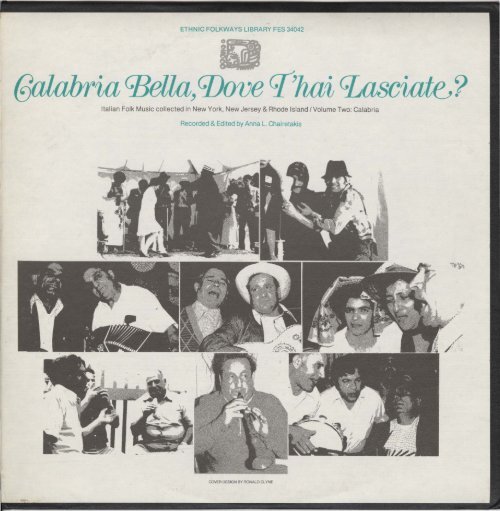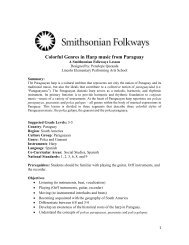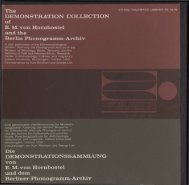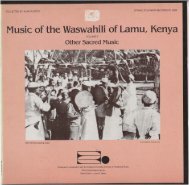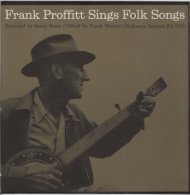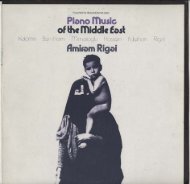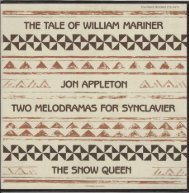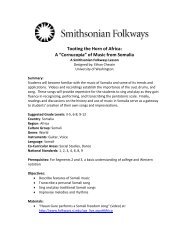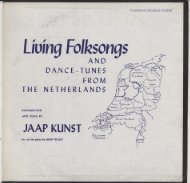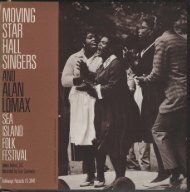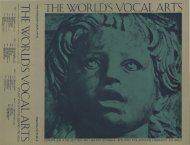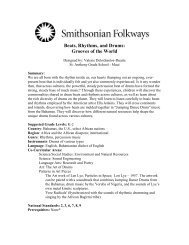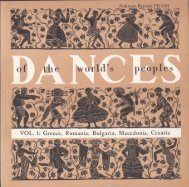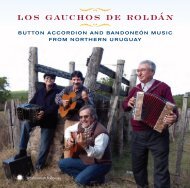@alabria CBella, Cf)ove Cf'hai CLasciate,?
@alabria CBella, Cf)ove Cf'hai CLasciate,?
@alabria CBella, Cf)ove Cf'hai CLasciate,?
You also want an ePaper? Increase the reach of your titles
YUMPU automatically turns print PDFs into web optimized ePapers that Google loves.
ETHNIC FOLKWAYS LIBRARY FES34042<br />
<strong>@alabria</strong> <strong>CBella</strong>, <strong>Cf</strong>)<strong>ove</strong> <strong>Cf</strong>'hai <strong>CLasciate</strong>,?<br />
Italian Folk Music collected in New York, New Jersey & Rhode Island / Volume Two: Calabria<br />
Recorded & Edited by Anna L. Chairetakis<br />
COVER DESIGN BY RONALD CLYNE
La Maddalena:<br />
Ai lero lero lero, s'ine jiuta e torna vene!<br />
E lu misi di jennaro qualme fa chilli nt>vere,<br />
quanno fa chilli neveri, quanno fa chilli neveri!<br />
Chorus: Oi coma ballano beddi sti figghiole,<br />
che Sant'Antonio Ii vuol aiutare!<br />
Vod' aiutare, vod' aiutare! Ue!<br />
[E ballate ballate ballate, femmine schette e maritate!<br />
Ca se nun abballi bona ne te canto e ne te suogno!<br />
Se non abbade pudita, io ci dico lu vostro zito!<br />
Eh! Eh! Eh!<br />
E ietta su muccattore, e iettace lu muccattore!<br />
E ietti lu muccattore a lu proprio bene tuo!<br />
Se lu bene tuo non ce iettacella a chine d'e!<br />
Iettacella ricamato comm' uno figlio d'enamorato!<br />
Iettacella 'e tre cudora pe' I 'amore 'e Salvatore!<br />
Oi lero lero lero, t'ei cantata la Maddalena!}<br />
Ese vota e se giria, e sempe suda 'a vidia!<br />
Ese vota e s'e girata e I'aiu vistu accompagnato!<br />
Ese vota a I'atro lato e pare na rosa soccodate!<br />
Ieh!<br />
E nella nella nella, su cungghiute I 'ammarelle!<br />
E c'en ha nu cuoccio amare, e u muccattoru vo<br />
camminare!<br />
Muccattore vo cammina! (2)<br />
Eh!<br />
2_ VILLANELLA DI ACRI<br />
La Rosetana: Mr. & Mrs. De Franco<br />
Lero lero lero, she's gone and back she comes!<br />
And the month of January when there are those snows<br />
those snows, those snows!<br />
Chorus: Oh how divinely these girls dance!<br />
Even Saint Anthony wants to lend a hand,<br />
lend a hand, lend a hand! UM<br />
[Dance, dance, dance, chaste and married women!<br />
If you don't dance well I won't sing to you or play!<br />
If you dance wantonly I ,viII tell your young man!<br />
And throw the handkerchief ... to your own bel<strong>ove</strong>d!<br />
And if your l<strong>ove</strong> isn't here, throw it to someone who is!<br />
Throw it with embroidery, pretty as a l<strong>ove</strong>-child!<br />
Throw it in tricolor for the l<strong>ove</strong> of Salvatore!<br />
Lero lero lero, I've sung you the Maddalena!}<br />
And she circled and she turned and I saw she was alone,<br />
and she circled and she hvisted and I saw he was escorted!<br />
And she turned another way, she was a rose in bloom! lCh!<br />
ella nella nella, the black cherries are ripe!<br />
There's a bitter one left <strong>ove</strong>r, and the handke,-chief<br />
wants to m<strong>ove</strong> on! Eh!<br />
The viUanella as a type of 3 to 4 part song was once a well-known contemporary of the madrigal. In<br />
Acri it is a serenade delivered in heterophoruc chorus by a mixed group of four or five who stand in a tight<br />
semi-circle with their arms about each other. (In a mixed group such proximity demands that the singers be<br />
related-an unrelated woman would stand slightly apart.) The leader throws his or head back and delivers<br />
the first line, and the others sing the choral parts into each othas faces, producing the vibrating effect on<br />
the sound waves called beating. Normally there are hvo alternating leaders in the Calabrian chorus: one<br />
makes the primary statement (ietta-"thrOws out"), and the other -'eChoes" It (revota-returns it), repeating<br />
the strophe or line in part. Leaders and chorus produce the drone harmony (accuorrlo). The high drone<br />
voice (squillo or caiauto) is usually sung by a woman. The songs can be reduced to an B-line en decasyllabic<br />
poem (the form of the ubiquitous strambotto)_ which is how they were formerly transcribed by collertors.<br />
2<br />
However, as De Simone points ou t, exclusive focus on the text has fostered the now questionable notion of<br />
a purely cultivated origin for these songs; it is of equal interest, for instance, to understand how the singers<br />
themselves divide up. their roles, create repetition, etc. (see also #8). Annunziata Chimenti, Angelo Gencarelli,<br />
Annunziato Chimenti, Francesca Feraco, Raffaela De Franco. Recorded at Sta. Rosalia's Church, Brooklyn.<br />
"Statement":<br />
Female ldr: 'E saputo ca a l'America vu jire<br />
ji lu diluvio pe ttia se<br />
Cho: vo'voteare-e-e<br />
Female ldr: Aie se vo voteare-<br />
Cho: e-e<br />
Chorus: oi pe ttia se vo' voteare-e-e-e-e<br />
"Echo":<br />
Male ldr: E cca vu jiri<br />
e lu diluvio pe ttia se<br />
Cho: va voteare-e-e<br />
Male ldr: E s'e d'e voteare<br />
Chorus: oie pe mia se vo' voteare-e-e-e<br />
The song continues:<br />
'u bu tr<strong>ove</strong>are ne d'acqua lie vino,<br />
si vuanno di siceheare Ii funteane_<br />
'u pu tr<strong>ove</strong> are chiesia pe' ei jiri,<br />
nemmen' isanti pe ti ci 'adoreare.<br />
Mo vaie lunteane e pu ci'arresimiglio:<br />
Calabria bella, duve t'hai lasciate?<br />
3. SERE NATA DI AMORE<br />
I've heard that you want to go to America;<br />
and the deluge will rain down upon you. (in judgement)<br />
You will find neither water nor wine,<br />
and the fountains ,viII dry up.<br />
You will find no church to enter<br />
nor even saints to worship.<br />
You'll go far away, and then you'll remember:<br />
beautiful Calabria, where have I left you?<br />
Villanella di Acri: Giuglio Gencarelli, Angelo<br />
Gencarelli, RaJJaela DeFranco, Annunziata Chimenti,<br />
Francesca Feraco, Annunziato Chimenti.<br />
Giuseppe De Franco sang this serenade to his wife before they were married, circling her house at<br />
night with his guitar and concertina. The words are improvised from a common stock, and the form is that<br />
of the stomello-2-3 line en decasyllabic verses, often invoking a flower. The vocal style is one typical of<br />
the South, and suggests much conflicting and pent up emotion. R. De Franco improvises a high drone part<br />
that intensifies the passionate mood of the song.<br />
Affaccia sta fenestra, eh rondinella!<br />
Affaeeia sta fenestra, oi rieeiolona!<br />
Me vene lu ehianto quanto ti vio.<br />
Chorus after every line: Eh-a-a-a-a-a-a-iy! UM Oil<br />
E nun te cuntera d'ia, gioiuzza mia ...<br />
Simpaticona mia, 'un me scuorda mail<br />
Ca te die' a te gioiuzza, tu vene tinne,<br />
e lassa stare tue fratelli, la lera lera!<br />
Simpatieona mia, simpaticona!<br />
C'alle iuorne alle du' 'un pozzu venire (2)<br />
a venire a trovare a ttia, simpaticona mia,<br />
e pe venire vicin a mia a n 'estare .nsiema!l ia!<br />
Ca te dico a te gioiuzza, tu vene tinne!<br />
Laseia stare i frate tue, ca nua tenime 'n aecorde,<br />
lascie stare i frate tue, simpaticona mia!<br />
Oi ni ed oi na, questa cosa non se puo fa!<br />
Come to the window, oh little swallow!<br />
Come to the window, curly locks;<br />
when I see you, I feel like crying!<br />
[I tell you, my precious, take a little stroll;<br />
['m waiting for you<br />
because I l<strong>ove</strong> you.]<br />
I don't count with you, my little joy!<br />
My l<strong>ove</strong>ly one, don't ever forget me!<br />
1 tell you, precious, come with me!<br />
Forget about your brothers, la lera lera!<br />
Iy nice one!<br />
I can't come today at two<br />
to see you, my l<strong>ove</strong>ly_<br />
to come near you, to be together! lid!<br />
1 tell you, my little joy, forget about your brothers<br />
for we have an understanding!<br />
(Wish them well and let's be off!)<br />
Oi ni ed oi na, this thing is impossible!
4. TARANTELLA CON CHITARRA BATIENTE<br />
An elegant and fashionable instrument in the 16th cent., the chitarra battente was eventually superseded<br />
by the modem guitar-save in southern Italy where it persists to this day as a folk instrument_ In<br />
Bisignano, near Acri, one artisan still mBkes them_ The battente has a deep body, arched back, and 5<br />
courses of strings, one of which runs just halfway up the neck, as in the banjo. The sound hole is c<strong>ove</strong>red<br />
with an ornamental rosette. G. De Franco (guitar), Fedcrico Gencarelli (tamborine), Nino Curatolo (bottle<br />
& spoons), G. Pellitteri (jews harp), performing at the Smithsonian Institution's Festival of American<br />
Folklife in 1976.<br />
5. VENERDI SANTO<br />
In Southern Italy religious festivals can be more or less pagan or folk in content and execution,<br />
depending upon the extent of penetration by the official church in a locality. The many Madonnas of the<br />
South, some of old cultic origin, some of more recent emergence, are the main foci of religious life. They<br />
are almost-human intermediaries with the powerful Almighty, dispensers of grace, luck, cures and protection_<br />
On Holy Friday the people of Acri carry the image of the Madonna Addolorata (Madonna of<br />
Sorrows) through the streets as the whole processional sings her a hymn of homage. Even at this recording<br />
session in a Brooklyn apartment, it was sung with great feeling. Francesco Chimenti, Annunziato Chimenti,<br />
Angelo Gencarelli, Giuglio Gencarelli, A. Chimenti, Maria Melito, R. De Franco.<br />
Ai tuoi piede, 0 beUa Madre, At your feet, oh blessed Mother<br />
verso pianto, I spill tears of pain.<br />
verso pianto<br />
di dolor.<br />
Per me prega il divin Padre,<br />
in te sola ha speme il cuor.<br />
Su 'na stilla con me versava,<br />
che versava il tuo Gesu.<br />
Mi comforta il cuor che langue,<br />
mi concede il tuo virtu.<br />
[SuI calvario e suUa via,<br />
teco voglio almen venir_ .. J<br />
6. LA STRINA DI SABATO SANTO<br />
Pray for me to the Divine Father,<br />
my heart is open to you alone.<br />
(I was born) under the same (evil) star<br />
that shone upon your Jesus.<br />
Comfort my languishing heart,<br />
give me your strength.<br />
{On Calvary, and along the road<br />
I want at least to be with you ... J<br />
Holy Saturday celebrates the end of-the Lenten fast and winter scarcity, and is a prelude to Easter.1n<br />
Calabria small banda of relatives and friends sing the strina from house to house on this day, and their hosts<br />
present them with a sausage, some wine, and other delicacies. When their sacks are fuU the little company<br />
goes off under the trees to dance and picnic. Some SerriceUesi in Westerly, R.I. still observe the custom,<br />
which provides an occasion for larks. In this recording, as often, the singers discuss their lines between<br />
verses, and comment upon the execution of the preceeding verse. Carmine Ferraro, R. De Franco (vocals),<br />
G. De Franco (guitar), Antonio Di Giacomo (tamborine).<br />
Senza chiamata ti sugnu venutu;<br />
o .car' amico, sia lu buon trovato,<br />
sia lu buon trovate-e-e-e-e-e!<br />
'U vuostro re ti manna 'no saluto,<br />
te via patruno 'e tutto u stato!<br />
[Nun vi spagnate ca nue simmu tante,<br />
ca simmo picca e non vodemmo nente,<br />
e co nu presutt' nu contenti tanti,<br />
e t'ha fatto cent' amici a nu momento!J<br />
Ed ha fatto la niva alia muntagna;'<br />
dio te manne tante esse buon anne<br />
'e quante allu muono se spannano i panni!<br />
Sento lu struscio neUo 'ntavolato<br />
e pienso ca mi piglia 'na suppressata!<br />
Without invitation we've come to you!<br />
Oh dear friend, well met!<br />
Your king senda greetings,<br />
he forsees you 'u be master of the whole state!<br />
[Don't be alarmed to see so many:<br />
we are few and want nothing!<br />
With one ham you'U content so manyyou'll<br />
make a hundred friends in a moment! J<br />
Snow has fallen in the mountain;<br />
God sends you as many of these good years<br />
as there is wash hanging out in the world!<br />
I hear creaking in the rafters:<br />
I think I'm going to get a sausage!<br />
3<br />
Siento 'nu struscio dello tavolinapienso<br />
ca me va piglio nu fiasch 'e vino! *<br />
Dio ti guarda 'sa cimma di parma<br />
'sa rosa russa che tien alla banna! **<br />
Ti dleo buona sera qUiUlDO >;egno,<br />
e te lasso 'a Santa Pasqua e iamme ninne!<br />
*Several verses omitted.<br />
"''''Refers to the wife.<br />
7. TARANTELLA COSENTINA-l<br />
[I hear rustling on the little table:<br />
I think I'm going to get a flask of wine! J<br />
God keep this frond of palm,<br />
this red rose you have at your side!**<br />
Carnevale, 1/ Dottore & La Quaresima:<br />
Giuglio Gencarelli, A. Chiment"!, Angelo Gencarelli<br />
I say good evening when I come,<br />
and 1 leave you with a Happy Easter, and let's be off!<br />
The tarantella appears to be individualistic and informal in its use of space and personnel. People get<br />
up to dance when they feel inspired, and sit down when they are tired. Tossing the handkerchief is a device<br />
Calabrians of these parts employ to pull people into the dance and to permit them to dance with their<br />
sweethearts: a man on the floor throws the handkerchief to a woman on the sidelines, she catches it and is<br />
"danced" by him, and in tum throws it to another. The two men weave figures of eight around the woman,<br />
then the first man retires, and so on. Domenico Retacco (vocal & tamborine), G. De Franco (organetto),<br />
Faust De Franco (triccaballacca), Antonio Mastrolia (jews harp), R. De Franco (high drone).<br />
E s'uocchi bielli campa alla mia menta,<br />
la mia mento!<br />
A·a-a-a! Ha-a-a! A-ha-ha!<br />
Uhf uhf uhf uhf" uhf<br />
E n 'ura ca nu ti vio, e n 'ura nun ti veo<br />
me la fazzo chianto! (2)<br />
Refrain: Oi d'a la mia menta, oi d'a la mia menta!<br />
Un ora ca nun ti vio fazzo chianto!<br />
Ii varca abballaf<br />
'A chianta mi la fazzo, oi veramento!<br />
La tua figura mi, la tua figura mi<br />
passa davanta!<br />
And these pretty eyes live in my mind,<br />
in my ":lind!<br />
One hour that I don't see you<br />
I spend in tears!<br />
Refrain: In my mind, in my mind!<br />
One hour that I don't see you<br />
I'm in tears!<br />
Evviva you dancers!<br />
I cry, truly, oh truly!<br />
Your image, your image<br />
passes before me! ...


